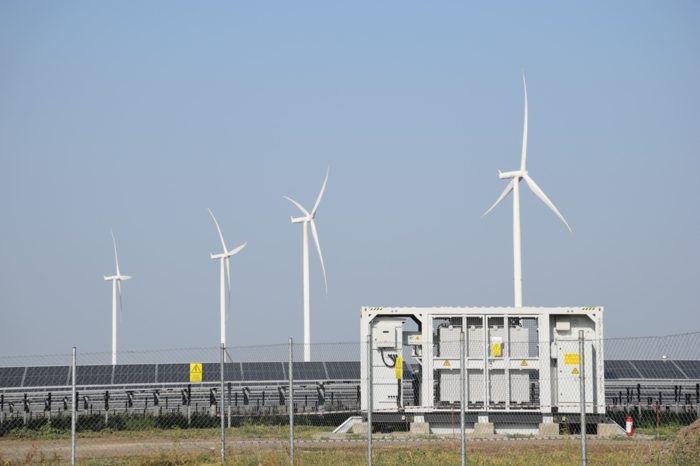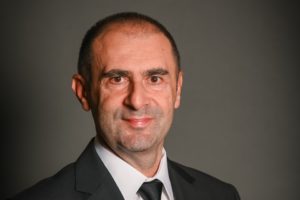INTERVIEW Corneliu Bodea, Adrem: “We see smart grids as the backbone of a modern, efficient, and sustainable energy system”

“I believe we are witnessing a change that the next generation will benefit from, and I am proud to be part of this journey. The energy sector presents significant opportunities for growth and innovation, both personally and for businesses. I’m pleased to share that Adrem is positioning itself to embrace these opportunities by engaging in renewable energy projects, infrastructure modernization, smart grids. We have established strategic partnerships with leading providers of energy equipment and innovative solutions to collaboratively deliver high-quality solutions and services. Also, we are committed to support innovation within our teams and continuously adapting to the evolving energy landscape to meet the demands of our partners, society, and communities,” Corneliu Bodea, CEO Adrem & President of Romanian Energy Center told The Diplomat-Bucharest.
What do you see as the most significant challenges facing the energy sector today, and how is Adrem addressing these challenges?
The last four years, marked by a pluri-crises context, sanitary, social, economic and military, brought us the most severe energy crises in decades. Issues of energy availability and affordability have highlighted the EU’s dependence on external supplies and the erosion of competitiveness. Consequently, security of supply, with its underlying factors of energy efficiency, infrastructure modernization and managing fluctuating energy prices, are key concerns both in Brussels and Bucharest. In my opinion, addressing these issues should be a priority for major players in the economy to ensure a smooth and just transition and to achieve targets in the most sustainable way possible. The uptake of digitalization and the evolution of AI increases the ability of the energy system to react in real-time, to balance demand with supply, to implement predictive maintenance programs, and, hopefully soon, optimize not only the load curve but also pricing. Besides technical requirements, regulatory reforms are needed to stabilize the market and promote transparency.
At Adrem, we are committed to becoming the most important national player in the energy transition, by providing solutions and services that meet the evolving needs of the industry. With extensive experience in automation, digitalization and smart grids, but also in physical works at the grid level, we are a key player in this field. We consistently invest in developing complete and innovative solutions, improvement of our internal workflow infrastructure, strengthening our team, attracting talent and be relevant in the job market, and expanding our portfolio of renewable energy projects. Our goal is to lead the energy transition and make a meaningful impact on society. Regarding the legal and regulatory frameworks, I actively advocate for initiatives that promote efficiency, stability and affordability, engaging with relevant authorities in my roles as CEO of Adrem and President of the Romanian Energy Center.
Electrification is a growing trend globally. How do you envision this impacting the energy landscape, and what opportunities does it present for Adrem?
In order to meet the climate objectives, electrification is estimated to play the most effect. It is significantly transforming the energy landscape, advancing environmental goals while also encouraging economic growth and resilience. The shift toward electric solutions in transportation, urban heating and cooling, and buildings is challenging, impacting the entire energy value chain – from generation to consumption. Because of this, we need to modernize almost the entire chain, including infrastructure, vehicles, heating and cooling systems, lighting solutions, appliances, and more. This transformation will create new jobs, new industries, and an entirely new ecosystem. Now is the time to adapt and invest in innovative technologies and sustainable practices to ensure our energy systems can meet evolving demands while supporting a sustainable energy future, with the overarching goal of competitiveness. I support collaboration among stakeholders, including governments, businesses, and communities, as it is essential for creating a cohesive strategy for a successful transition.
For Adrem, electrification trend opens significant opportunities to innovate in multiple areas, particularly in our areas of expertise: EPC (engineering, procurement, and construction), SCADA and automation, SMART ASSET MANAGEMENT SYSTEM (AMS), and SMART METERING solutions across sectors such as electricity, district heating, oil and gas, and electrified transport.
By utilizing digital solutions, we are prepared to facilitate a smooth, greener energy transition alongside our partners, meeting today’s demands for energy efficiency.
Smart grids are increasingly being seen as vital for modernizing energy infrastructure. Could you share Adrem’s approach to integrating smart grid technologies and the benefits they bring?
We see smart grids as the backbone of a modern, efficient, and sustainable energy system, because their benefits are profound. Integrating smart grid technologies means enhanced grid reliability and resilience through automation and real-time management, improved energy efficiency for both utilities and end consumers, reduced waste and costs, seamless integration of renewable energy sources and proactive maintenance.
Building on these advantages, our approach prioritizes the digitalization of energy infrastructure, with a special focus on smart metering. We are currently a proud leader in smart metering installation, having deployed close to two million smart meters across Romania through key projects. Additionally, we offer advanced smart grid solutions such as SCADA systems, which provide real-time monitoring and control of energy networks, and ADMS (Advanced Distribution Management Systems), for safer and more efficient operations of distribution networks.
Our approach is not just about technology, it’s about impact. We are aiming to enhance utilities with data-driven insights and provide smarter energy choices; we are aiming to enable more reliable, efficient, and adaptable grids, fit to meet the demands of tomorrow.
We are also deeply involved in building knowledge and widening and deepening our skills, by keeping our workforce relevant and ahead of the developments. The energy transition, the advancements of digital technology and the uptake of AI, generation and grids requirements, are all impacting the global workforce, and subsequently our ability to respond to market needs.
With the rise of prosumers, how is Adrem adapting its business model to accommodate this shift in consumer behavior?
According to the latest official data from the Energy Regulator ANRE, as of November 2024, we are approaching 200,000 prosumers, with a total installed capacity of 2,400 MW, more than three nuclear reactors at Cernavoda. Hence, we are fully aware of the growing impact of prosumers on the energy sector, and we channel a lot of effort to help both end consumers and grids to adapt to this shift by modernizing energy infrastructure. We are focused on ensuring that the grid can handle the increasing volume of energy produced by prosumers. It is important to acknowledge that we are likely to face significant challenges in integrating prosumers and photovoltaic projects due to the lack of flexible, intelligent networks that can accommodate large volumes of decentralized energy. To address this, Adrem is working on enhancing grid flexibility, digitalizing infrastructure, and expanding the deployment of smart metering systems. We are also collaborating with industry stakeholders and authorities to ensure the energy network evolves in line with prosumer growth, making sure we can integrate and support this shift effectively while optimizing energy efficiency.
What are some of the key technologies or innovations that you believe will shape the future of the energy sector and how is Adrem positioning itself to leverage these advancements?
The EU, with Romania following suit, is in the midst of a major shift regarding the way we produce, transport and use the energy. This energy transition is guided by both technologies and transformative trends, but also mindset, we are witnessing the advancements of AI and how advanced IT systems reshape energy management systems by enabling bi-directional real-time monitoring and control, predictive maintenance, advanced analytics, and many more. The global shift towards cleaner energy sources and the electrification of hard to abate sectors, like transportation, is also accelerating. We support this transition by working towards modernizing the energy infrastructure, to accommodate the charging infrastructure and integrating renewable energy into smart grids, ensuring a seamless supply of clean, reliable and affordable energy. There is increased interest in flexible consumption models as energy markets demand greater flexibility, and we are also trying to accommodate that through data-driven solutions and smart metering. The recent rise of renewable energy highlighted the need for innovative storage systems. We are actively exploring and supporting the deployment of such energy storage technologies that can enhance grid stability and manage peak loads. Nuclear fusion will also hold transformative potential in the energy industry in the next few decades, as it is a promising source of limitless and sustainable energy. While still in its early stages, Adrem is closely monitoring developments in this field to understand how these breakthroughs could complement existing energy systems and cater to that.
We are committed to embedding these technologies and closely following these key technologies, and we’re trying to stay prepared to adapt and integrate them into sustainable energy systems.
How does Adrem navigate the regulatory landscape, especially concerning renewable energy integration and grid modernization efforts?
We actively advocate for regulatory reforms that promote energy efficiency, renewable energy integration, the uptake of storage technology, advancements of digital technology and AI, by engaging with relevant authorities. Through these positions, we strive to influence policies that support sustainable energy practices and improve the integration of renewable resources into our energy systems. The energy sector needs a favorable regulatory environment that promotes innovation and drives the transition toward a more efficient and sustainable energy future. By collaborating with stakeholders and participating in discussions, I believe we can contribute to meaningful change.
Energy storage is becoming increasingly important for grid stability and renewable energy integration. Can you discuss Adrem’s strategies for incorporating energy storage solutions into its offerings?
At Adrem, we continuously explore innovative energy storage technologies that align with industry advancements. We are constantly adapting our portfolio of products and services to meet the actual and future needs of the market and across the entire value chain of the energy sector. We collaborate with top providers of high-quality battery technologies understanding that each partner’s requirements are unique and develop customized energy storage systems. This allows us to address specific challenges in energy management, whether for large-scale projects or smaller applications.
Cybersecurity is a significant concern in the energy sector, especially with the proliferation of interconnected systems. How does Adrem ensure the security and resilience of its infrastructure and services?
The huge evolution of decentralized assets and the uptake of digitalization bring new challenges and cyber threats. We have implemented a comprehensive security framework that includes regular risk assessments, advanced network monitoring, and continuous employee training on best practices. Also, we work with cybersecurity experts to adopt the latest technologies and protocols. Regular security audits and testing help us identify vulnerabilities and create strategic defenses against emerging risks.
Looking ahead, what do you believe are the most promising opportunities for growth and innovation in the energy sector, and how is Adrem positioning itself to seize these opportunities?
I believe we are witnessing a change that the next generation will benefit from, and I am proud to be part of this journey. The energy sector presents significant opportunities for growth and innovation, both personally and for businesses. I’m pleased to share that Adrem is positioning itself to embrace these opportunities by engaging in renewable energy projects, infrastructure modernization, smart grids. We have established strategic partnerships with leading providers of energy equipment and innovative solutions to collaboratively deliver high-quality solutions and services. Also, we are committed to support innovation within our teams and continuously adapting to the evolving energy landscape to meet the demands of our partners, society, and communities.















